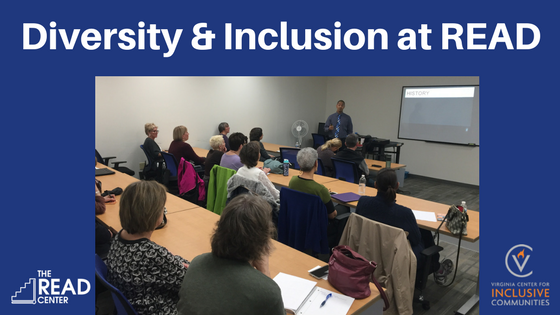The READ Center recently collaborated with the Virginia Center for Inclusive Communities (VCIC) to provide a Diversity and Inclusion training for tutors and teachers. At The READ Center, we pride ourselves on providing an inclusive environment for our students to learn and volunteers to tutor. When groups of people from different backgrounds come together, as they often do at READ, it’s an opportunity for all to learn, grow, and respect one another, but sometimes challenges arise.
The training asked each participant to examine his/her personal lens, perspective, and unconscious bias using real-life READ Center scenarios. The training concluded with best-practices and strategies for successfully creating inclusive spaces for learning. Some of the strategies included:
- Eliminating assumptions
- Building relationships
- Talking through expectations
- Active listening and reflection
I’ve been asked why READ needed this training a few times, so I wanted to share my thoughts.
The READ Center exists to support adults on their journey to improved literacy skills.
That sounds straightforward enough, right? We’d like to think so. However, in reality, we are talking about human interaction between people with a variety of life experiences, family backgrounds, and unconscious biases. Then you add in the beliefs, power dynamics, and perceptions around low literacy and you have a recipe for potential hurt feelings and negative experiences.
One of the activities at the training required the participants to break into groups and discuss scenarios of student-tutor interactions that damaged the effectiveness of the learning environment and stripped away the dignity of the students. Participants were audibly incredulous about the scenarios, and even more so once I revealed that they were all real-life examples that I have collected over the last year.
Some examples include:
- Referring to adults as “boys, girls, kids, or son”,
- Tutor surprise and disbelief that the student they were paired with holds a high position at a major employer,
- A tutor projecting his own insecurities about using a computer onto his student, and
- A tutor providing unsolicited advice on a personal matter to a student in the classroom.
There is no way to eliminate unconscious bias. It is our jobs, staff and volunteers, to limit these types of undesirable interactions. For our part, READ will be providing Diversity and Inclusion training on a regular basis, as well as incorporating a mini-session into tutor training. From our volunteers, we ask you be self-aware, thoughtful, and join us for the next training session. It is our hope that the ongoing Diversity and Inclusion trainings will be one of the ways we can improve interpersonal interactions and students’ experience.
Thank you for your commitment to READ!
The READ Center received positive feedback from volunteers and teachers who participated. One said, “I appreciate that the staff is addressing these issues through workshops and discussion. Are the students given an opportunity to address any issues they may have in a survey or some type of feedback loop?” READ students provided feedback on their classes during our first class evaluation survey conducted in the fall. In the 2018-2019 academic year, we are starting a Student Council to give students an opportunity to make their voices heard.
_________________________________________________________
Volunteers are the life-blood of our adult literacy programs. We are fortunate to be at-capacity with volunteers for the moment, but needs may change. We’d love to stay in touch with you about future opportunities.


